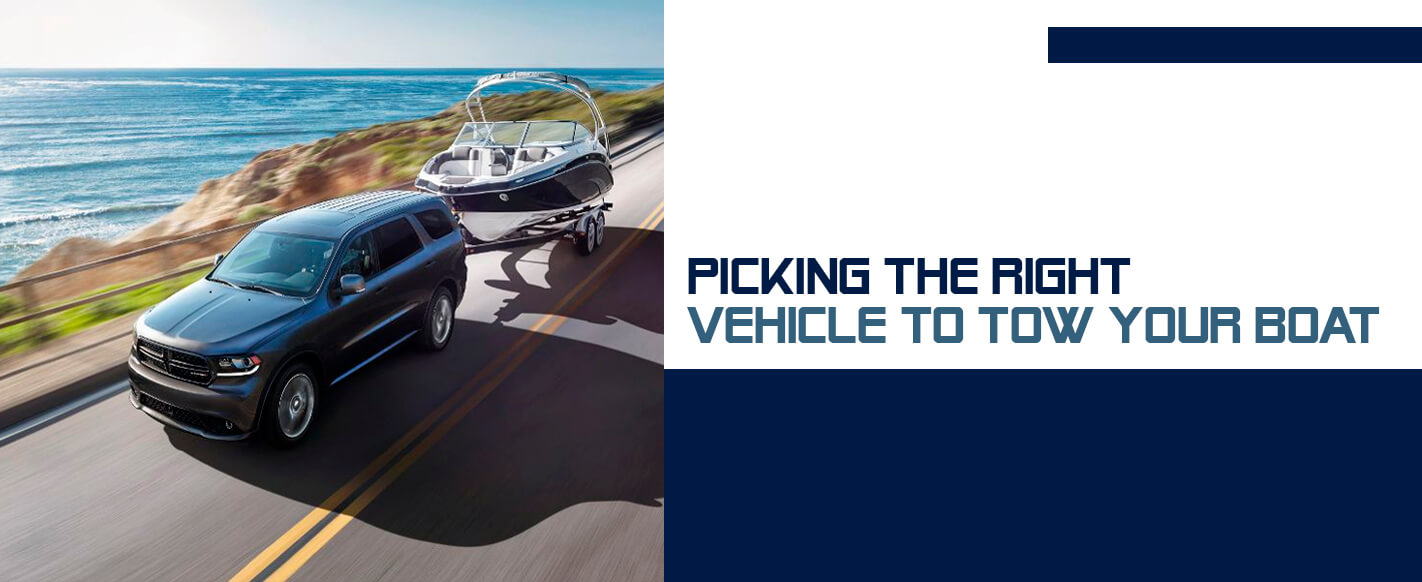
Moving your aquatic adventures to new locations is a great part of boating — whether it is finding your new favorite cove in a lake, exploring rivers or new stretches of ocean coast. Unique experiences like these are what make life-long memories with your friends and family and start traditions that keep everyone coming back. But no matter what direction you think you’ll head first, you’ll need a vehicle capable of getting your boat there comfortably.
If you’ve just purchased a new boat or you’re a prospective buyer, you may be thinking about what vehicle is right for towing. Having a truck or SUV that’s well-equipped for trailering your boat is vital for safety as well as performance. You don’t want a vehicle that’s borderline-underpowered since you need fine control for launch ramps and fuel efficiency for long trips.
Throughout this boat towing guide, we’ll offer a few tips and explore common questions you may have about finding the right tow vehicle for your boat.
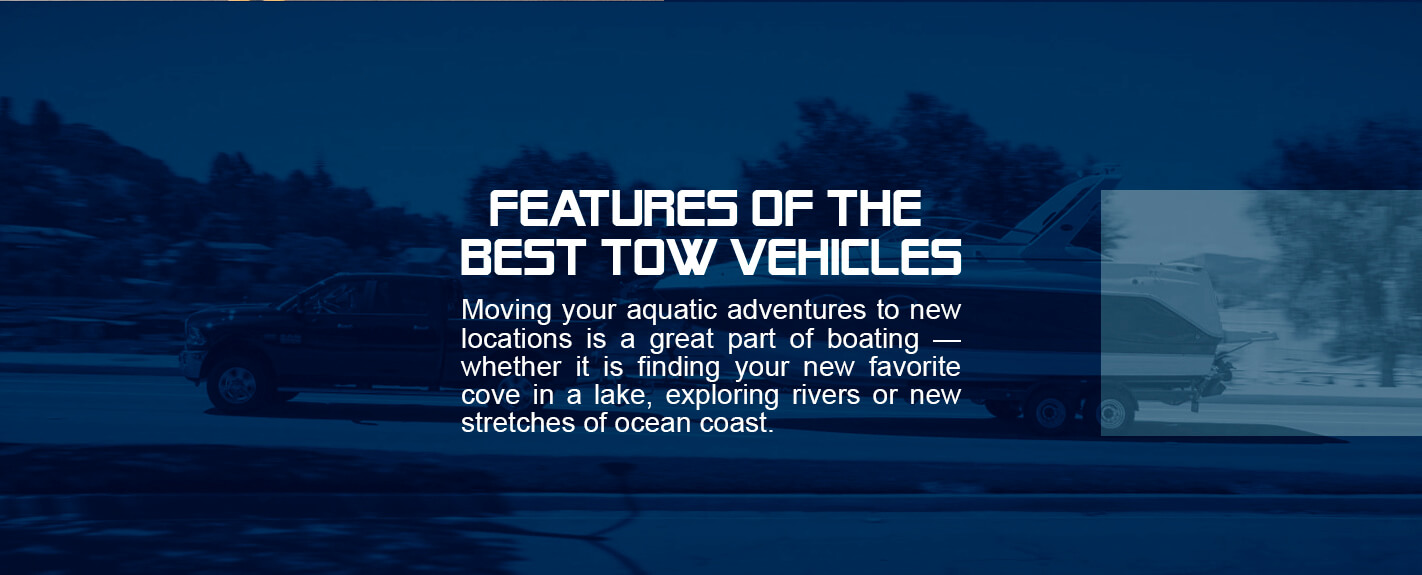
Features of the Best Tow Vehicles
If you’re thinking about joining the over 100 million Americans who participate in recreational boating, you’ll need a powerful vehicle to meet up with your new friends.
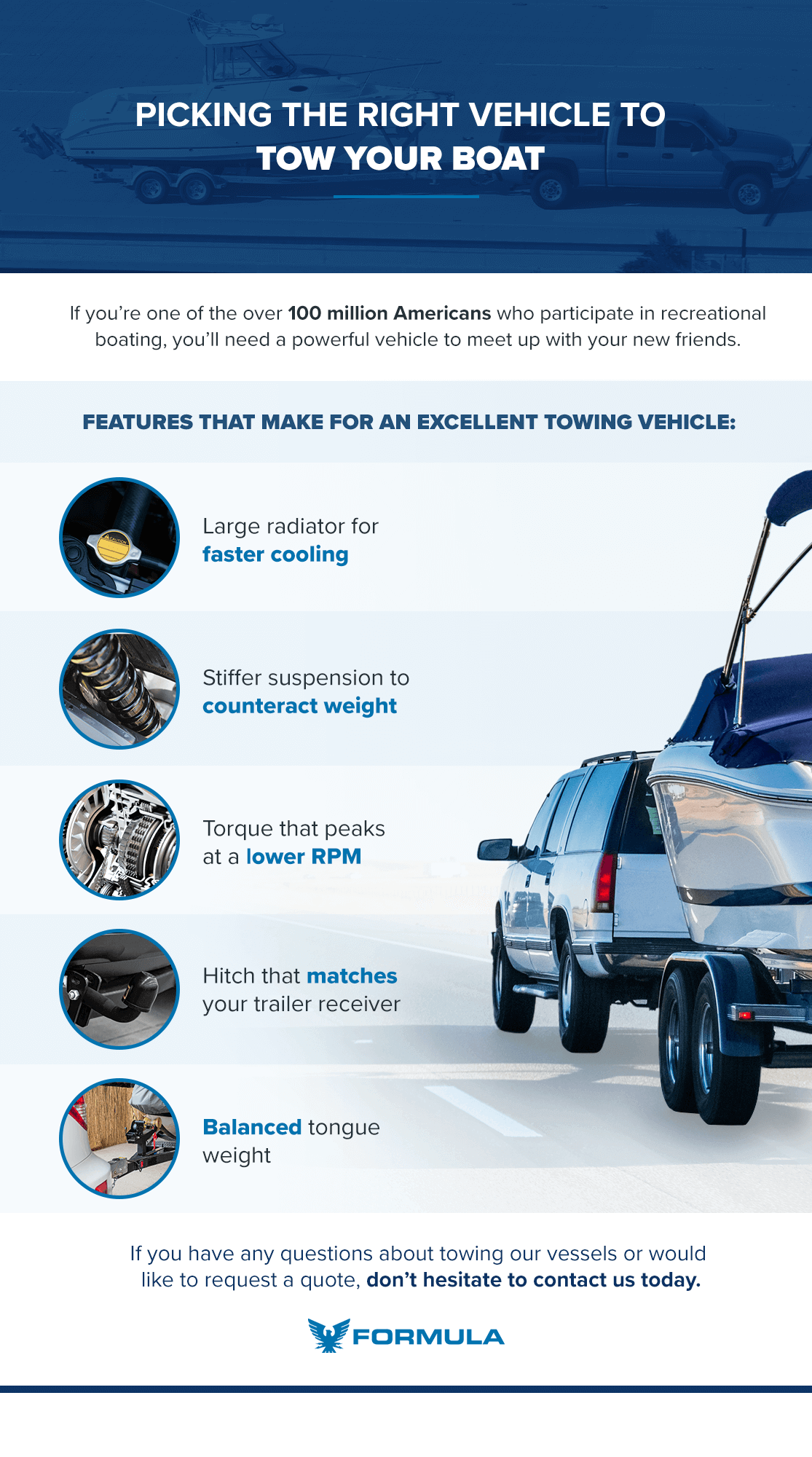
Besides the foundation of having a high-enough towing capacity, there are a few more things that make for an excellent towing vehicle, such as:
– Large Radiator — Towing puts more strain on your vehicle and its engine than everyday driving, which means it needs the help of a larger radiator to cool its system faster and prevent overheating.
– Suspension — Vehicles equipped for towing have stiffer suspension designed to counteract the added weight from the boat and trailer. Not only does it give you a better ride, but it also helps maintain traction and performance.
– Torque — Any good towing vehicle will have plenty of low-end power. While a high top speed is always nice, towing is all about being able to move with ease at low speeds while maintaining control. And when you’re pulling your boat up a steep or slippery ramp, power is precisely what you want. If you’re choosing between two vehicles with the same amount of torque, look for the one that reaches peak torque at a lower RPM. It will perform better with less strain on the engine. If you’re planning on towing something huge and want even more power, some towing vehicles may be available with diesel engines.
– Receiver Hitch and Wiring Harness — These are essential for any vehicle equipped for towing. They come standard, but you need to make sure the size — or number — of your towing hitch matches your trailer receiver. Also, a heavy-duty wiring harness is a good idea to ensure it keeps on working after several dunkings and long road trips. You don’t want your trailer lights going out on the road.
– Additional System Cooling — If you plan on taking your boat on long road trips and on the interstate, extra cooling capabilities can help keep your systems from overheating. Look for vehicles with large transmission and oil cooling capacities. These are common in most vehicles designed for towing.
– Transmission Gauge — This one usually doesn’t come standard on most vehicles, but you may want to consider it as an additional safety precaution. Automatic transmission failure is often a result of overheating, and the added strain of towing a large boat and trailer means a lot more work and heat for your system.
– Towing Mode — Quality towing-capable vehicles will have a towing mode. It allows your transmission to delay upshifting and keeps it out of higher gears when necessary, which is easier on your vehicle’s system and better for its long-term health. Also, keeping your car in Overdrive will help you save fuel while towing.
– An Adequate Trailer — Most boats sold today will come with a specially designed trailer for that specific model. A trailer specifically made for your boat is essential for maintaining weight distribution on your vehicle’s hitch.
– Tongue Weight — This is the weight pressing down from the tongue of the trailer onto the hitch ball. It should be about 10 percent of the combined weight of the boat and trailer. If there is too much tongue weight, it will weigh down the back of your vehicle too much and will make traction and steering difficult. On the other hand, if there’s too little tongue weight, the trailer will not be as stable and could fishtail from side to side when in tow.
Tips for Finding the Right Tow Vehicle for Your Boat
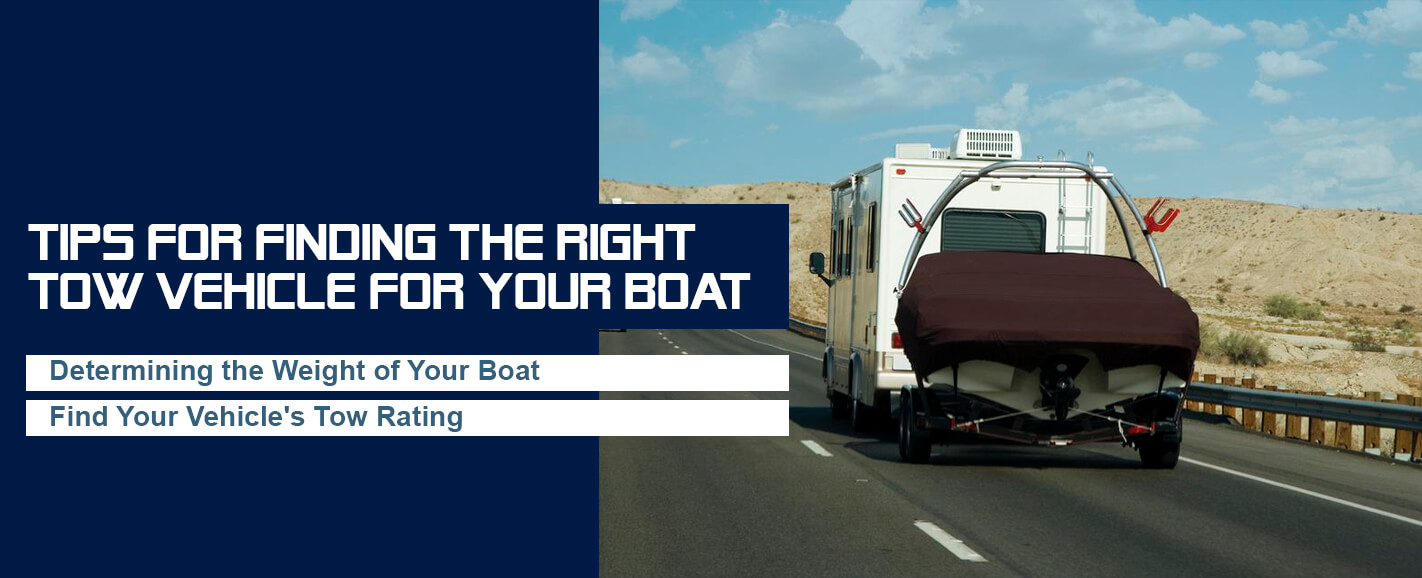
Selecting the right vehicle to tow your boat depends on your personal preference, of course, but there are a couple of steps you can take to determine which vehicles meet the essential requirements for boat trailering.
1. DETERMINING THE WEIGHT OF YOUR BOAT
The primary step in finding the best vehicle to tow your boat is figuring out how much your boat — or future boat — weighs. Manufacturers rate vehicles for specific towing capacities, so you can quickly weed out the ones that don’t qualify.
When calculating the weight of your boat, you have to remember that manufacturers base their ratings for weight on empty vessels. That means once you have your boat full of fuel, water toys and other gear, that number will be significantly higher. Take an inventory and do some calculations based on your boat’s capacity for fuel and equipment. For a reference — gasoline weighs about 6.1 pounds per gallon, and water about 8.3 pounds per gallon.
2. FIND YOUR VEHICLE’S TOW RATING
Next, you need to determine how much your prospective towing vehicle can carry.
Car manufacturers set towing ratings as if there is only a driver in the car. This is unlikely, though, because you’ll probably be loading up the whole family, coolers and other goods — so you will need to factor in potential passengers and cargo, too.
Once you know the potential weight of your vehicle’s cargo, add that to the weight of your boat and trailer — the total of these two things is what’s known as the “Gross Combined Weight” or GCW. Vehicles have a Gross Combined Weight Rating — or GCWR — which is the max amount of weight your car can handle. Once you know your GCW, you can start looking at different vehicles and towing packages.
An excellent place to start if you’re unsure which vehicles have the towing capacity you need is the Tow Rating Database through Axle Advisor. But keep in mind, it’s essential to leave yourself extra towing capacity for the sake of safety and performance — long trips, steep hills and less-than-ideal conditions could have a lesser vehicle struggling.
Where else can you find a vehicle’s tow rating? Besides online resources, cars have tow ratings listed on their data plate — which is typically inside the driver-side door, glove compartment or another easily-accessible area. Keep in mind that the number you see is the absolute limit your vehicle can tow, meaning you don’t want to come anywhere close to that number for regular use. Besides being dangerous, it’s inefficient, will stress your car’s transmission and engine and will void your warranty if there’s a malfunction.
It’s also a good idea to research state laws where you intend on using your boat to learn about any specific ratings or equipment you’ll need — you can find this information through AAA’s Digest of Motor Laws by state.
Common Vehicles Used for Boat Trailer Towing
Arguably the best-suited vehicles for towing boats are large pickup trucks like the Toyota Tundra, Ford F-Series, Chevrolet Silverado, GMC Sierra and Nissan Titan. There are plenty of capable options in this category, so you have the freedom to choose a manufacturer you like. These options all have steel frames designed to tow and stand up to enormous amounts of strain as well as engines with lots of low-end torque.
Another benefit of using a pickup truck to tow your boat is the truck bed — it makes loading gear for the day quick and easy, and you can keep anything wet or dirty off the interior.
If you’re looking for a vehicle with a little more crossover capability for everyday life, there are some SUVs that are perfectly capable of towing, too. The Toyota Sequoia, Ford Expedition, GMC Yukon, Chevrolet Tahoe and Suburban are a few of the tow-capable SUVs available. Some have impressive towing capabilities and are comparable to their pickup truck counterparts.
In the end, it all comes down to your personal preference once you have the weight requirements figured out. A lot of the towing options mentioned above are more than equipped to handle towing anything that you would want to put on a trailer.
Deciding Between Two-Wheel, Four-Wheel and All-Wheel Drive
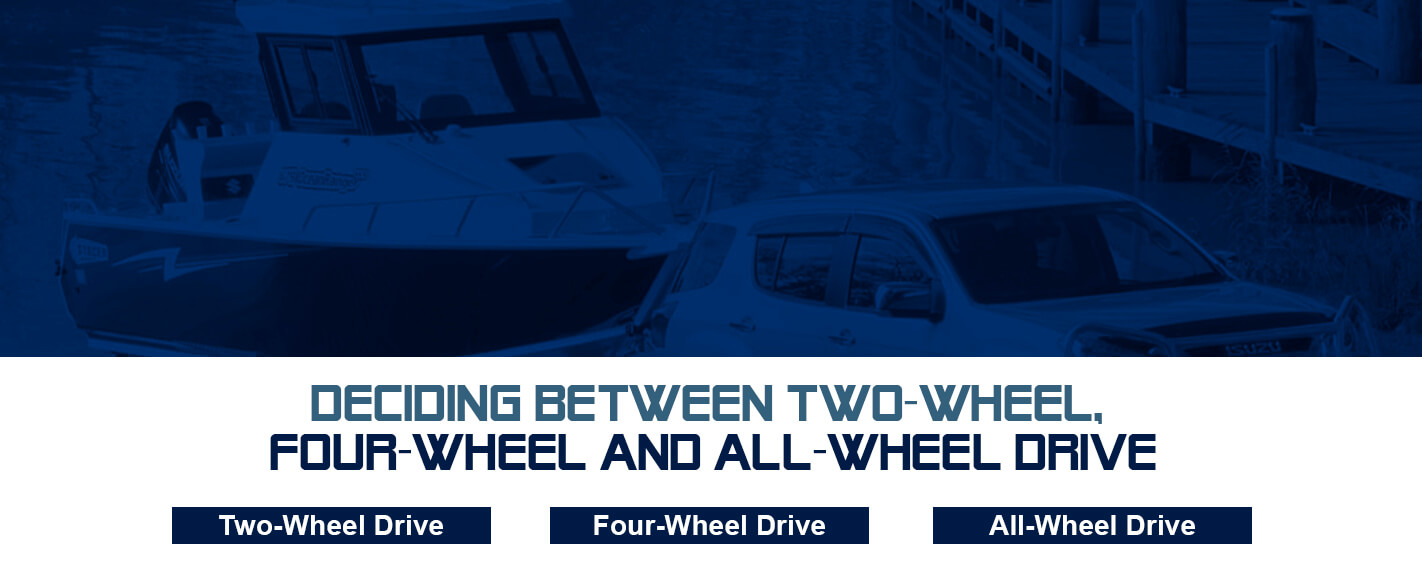
One question people often have when looking for a towing vehicle is: Which is better — two-wheel, all-wheel or four-wheel drive? The answer isn’t simple, as they each have advantages, but in short — two-wheel drive offers the most towing power, four-wheel drive provides the best low-end torque and all-wheel drive has excellent traction. Let’s get into the details.
1. TWO-WHEEL DRIVE
Contrary to what most people might think, two-wheel drive vehicles have more towing power than other types of drive systems. This is because they don’t have to spend extra energy to spin another axle, which means they have more energy for forward movement. Also, there’s a mechanical advantage with front-wheel drive systems — being underneath the weight of the engine and the fact that the wheels are pulling instead of pushing gives the vehicle better towing power.
However, some argue that even while they have the potential to tow more — two-wheel drives aren’t as safe for launching your boat — especially if the car is front-wheel drive. When you’re on a steep ramp and the weight from the trailer in pushing down on the back of the vehicle, it can reduce the traction of the front wheels — which means less power and less torque. But, if your launching routine won’t include frequently using steep and slippery ramps, a two-wheel drive could be a viable option.
2. FOUR-WHEEL DRIVE
Four-wheel drive may have less towing capacity, but it makes up for it with traction and low-end torque. If you plan on frequently launching your boat on steep and potentially slippery ramps, you may want to consider something with four-wheel drive, or at least a four-wheel drive option.
Four-wheel drive systems have a separate, low-range gear system that gives you more torque and a better gear ratio — which means more power and control when making minor adjustments. They come at a cost, though — exclusively four-wheel drive systems often add several hundred pounds to your car, as well as reduce your fuel efficiency and can require extra maintenance.
Some vehicles have the option to engage four-wheel or all-wheel drive instead of having it on all the time. This way, you get the increased towing capabilities and fuel-efficiency of two-wheel drive for long distances, and the increased traction and torque on the launch ramp.
3. ALL-WHEEL DRIVE
All-wheel drive vehicles don’t have an extra low-range gear like four-wheel drives, so there isn’t as much power, but they are very good at maximizing traction. Since every wheel can spin independently and is controlled by the vehicle’s sophisticated computer system, each one adjusts to optimize traction and performance in slippery conditions. For example, if one wheel is slipping, the computer automatically adjusts the power to the other wheels to aid it.
The common perception about all-wheel drive is that it is ideally suited for driving in all weather conditions, but it’s not as capable at slow speeds like four-wheel drive — due to the extra range of low gears.
While there’s a lot to remember when it comes to capabilities and ratings, many dealers offer a package deal for towing vehicles, which will give you an excellent idea of the capabilities and options available. Also, if you choose to buy from a private owner, you can find a vehicle that’s already fully-equipped with all the towing modifications.
About Formula Boats
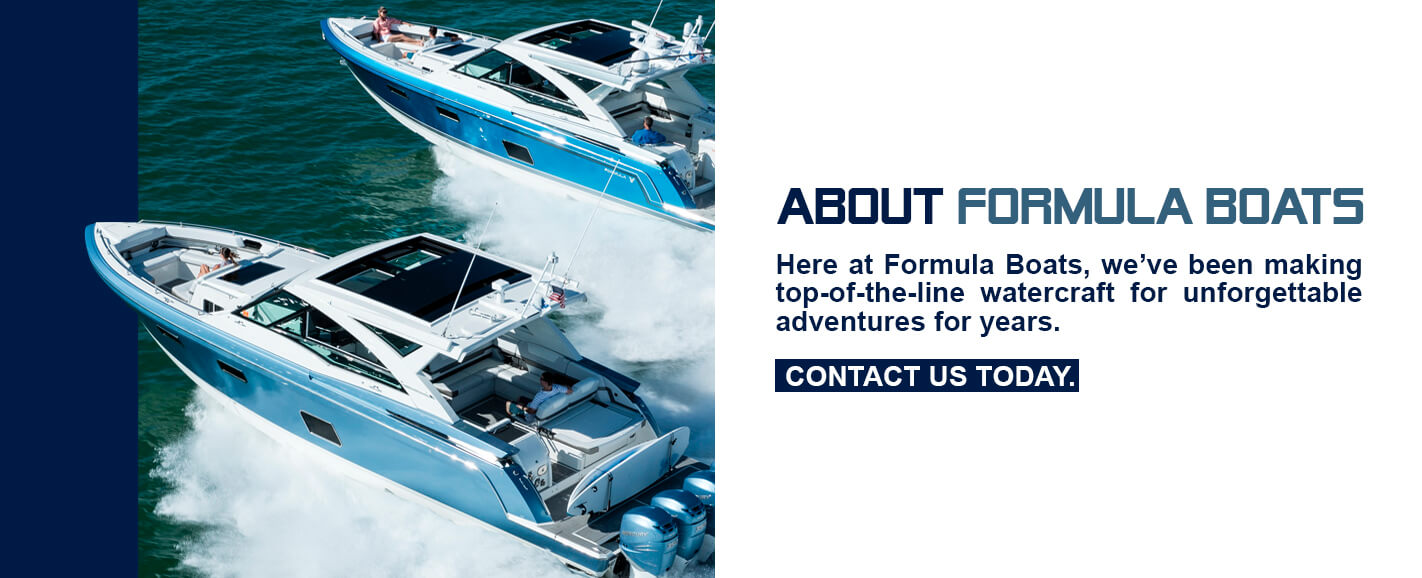
Here at Formula Boats, we’ve been making top-of-the-line watercraft for unforgettable adventures for years. As avid boaters ourselves, we love to help our customers make lifelong memories like the ones we cherish.
Nothing is more important than protecting you and yours — that’s why we strive to provide our customers with the knowledge to help them always have a safe and enjoyable time on the water. We use that same philosophy when we design our boats. Performance and safety come from the highest-quality materials and industry-leading engineering — there’s a reason our boats are world-renowned, and our customers keep coming back.
For over 60 years, we’ve been committed to excellence and don’t settle for anything less than the best. Owned and operated by the Porter family, everything we do is personal.
Our Bowrider and Sun Sport lines are the perfect boats to take on the road. No matter what it is you like to do on the lake, river or ocean, these boats are ready to get you into the mix. With wraparound lounges, entertainment wetbars and spacious swim platforms, fun and relaxation are all just a step away.
Please feel free to browse our wide selection of towable boats, and if you have any questions about towing our vessels or would like to request a quote, don’t hesitate to contact us today.
